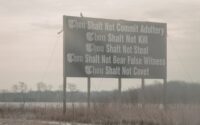The Wheat And The Tares

A faithful student of the Bible should know that parables were a useful way of teaching important lessons. Our Lord utilized this method of teaching numerous times. On one occasion, Jesus taught, “…The kingdom of heaven is likened unto a man which sowed good seed in his field: But while men slept, his enemy came and sowed tares among the wheat, and went his way. But when the blade was sprung up, and brought forth fruit, then appeared the tares also. So the servants of the householder came and said unto him, Sir, didst not thou sow good seed in thy field? from whence then hath it tares? He said unto them, An enemy hath done this. The servants said unto him, Wilt thou then that we go and gather them up? But he said, Nay; lest while ye gather up the tares, ye root up also the wheat with them. Let both grow together until the harvest: and in the time of harvest I will say to the reapers, Gather ye together first the tares, and bind them in bundles to burn them: but gather the wheat into my barn” (Matt. 13:24-30).
Parables are known for having one major point and for utilizing common things to represent other things. In the preceding parable, the main lesson that Jesus taught is that even in the church there will be some that are not fruitful, Heaven bound individuals.
Often the “kingdom” is a reference to the church of Christ. Jesus spoke of the kingdom and the church interchangeably when He said, “And I say also unto thee, That thou art Peter, and upon this rock I will build my church; and the gates of hell shall not prevail against it. And I will give unto thee the keys of the kingdom of heaven: and whatsoever thou shalt bind on earth shall be bound in heaven: and whatsoever thou shalt loose on earth shall be loosed in heaven” (Matt. 16:18-19). In the case of this parable, there is a reference to a “man’s field,” which corresponds to the kingdom/church of Christ.
The “good seed” is not hard to identify either. While explaining another parable, Jesus instructed, “…The seed is the word of God” (Luke 8:11). Therefore, it is the word that needs to be “planted” in the hearts of men. After all , “So then faith cometh by hearing, and hearing by the word of God” (Rom. 10:17).
The “enemy” is ultimately Satan. “Be sober, be vigilant; because your adversary the devil, as a roaring lion, walketh about, seeking whom he may devour” (1 Pet. 5:8).
The “wheat” is of course what the “good seed” brings forth. Well, if a person allows the Scriptures to do their work, what is produced? “For I am not ashamed of the gospel of Christ: for it is the power of God unto salvation to every one that believeth; to the Jew first, and also to the Greek” (Rom. 1:16). Faithful children of God/Christians are the “wheat” of the parable.
The “tares” are a reference to those that are in the “man’s field”, but instead of being fruitful, they instead cause problems for the “wheat”. Christians need to continue to grow (2 Pet. 3:18). When agents of the “enemy” cause problems in the church of Christ, it can make it more difficult for the faithful child of God to grow as well as he should. How many Christians have fallen away because of some other member of the church binding scruples, laying stumbling blocks before their brethren, and having to have their own ways in matters that are not doctrinal? Each time that happens, the “enemy” has successfully caused the crop to be less than it could be.
That brings us to what “the harvest” actually depicts. There can be no doubt that “the harvest” is a depiction of the Day of Judgment. On that Day, every person will be brought before the judgment seat of Christ (Matt. 25:32; 2 Cor. 5:10). It will be a day when the “wheat” is brought into the “barn” and the “tares” will be removed for punishment (Matt. 25:41, 46).
While many may continue to cause disruption in the body/church of Christ, we should be encouraged that our Lord takes notice. The parable studied in this article helps us to understand that when the time of “harvest” arrives, the Lord will handle the situation. “For we know him that hath said, VENGEANCE BELONGETH UNTO ME, I WILL RECOMPENSE, saith the Lord. And again, THE LORD SHALL JUDGE HIS PEOPLE. It is a fearful thing to fall into the hands of the living God (Heb. 10:30-31).
~ Corey Barnette
Related Posts

Will God Ignore Sin Because He Loves Us?

Should We Still Follow The Old Law Of Moses?
